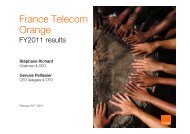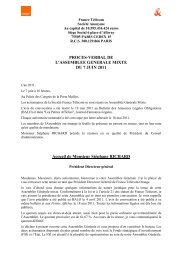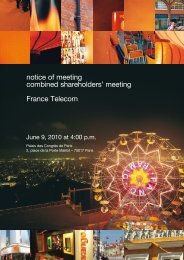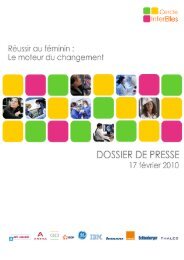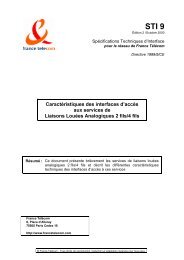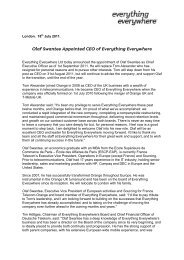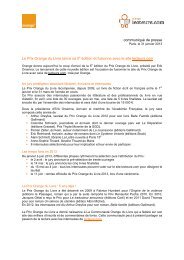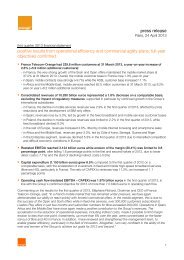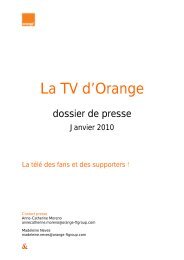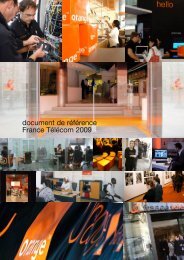registration document France Telecom 2009 - Orange.com
registration document France Telecom 2009 - Orange.com
registration document France Telecom 2009 - Orange.com
You also want an ePaper? Increase the reach of your titles
YUMPU automatically turns print PDFs into web optimized ePapers that Google loves.
financial information concerning the issuer’s assets and liabilities, financial position and profits and losses<br />
20<br />
CONSOLIDATED STATEMENTS<br />
agreement, on January 7, 2010, <strong>France</strong> <strong>Tele<strong>com</strong></strong> transferred<br />
to the French State the amount in escrow together with<br />
53 million euros of interest on the amount as of November 30,<br />
<strong>2009</strong> and not recognized as in<strong>com</strong>e, representing a total<br />
amount of 1,017 million euros. See Note 30 for the impact<br />
on cash fl ows.<br />
■ The second procedure also follows an investigation opened<br />
by the European Commission in January 2003, relating to<br />
the fi nancial measures announced by the French State on<br />
December 4, 2002. On that date, the French State announced<br />
that it was prepared to extend a shareholder’s loan to <strong>France</strong><br />
<strong>Tele<strong>com</strong></strong> in advance of its participation in a capital increase<br />
alongside private investors. This shareholder’s loan was never<br />
actually put in place. In 2004, the European Commission<br />
found that these fi nancial measures were in<strong>com</strong>patible with<br />
the <strong>com</strong>mon market but did not require any repayment of<br />
State aid. The French State and <strong>France</strong> <strong>Tele<strong>com</strong></strong> but also<br />
Bouygues <strong>Tele<strong>com</strong></strong> and the French association of network<br />
operators and tele<strong>com</strong>munications services (AFORS<br />
<strong>Tele<strong>com</strong></strong>) lodged appeals against the Commission’s decision<br />
before the General Court of the European Union . The hearings<br />
before the General Court of the European Union occurred on<br />
April 22, <strong>2009</strong> and its decision is expected during the fi rst<br />
half of 2010. The General Court of the European Union might<br />
conclude that the fi nancial measures constitute a State aid<br />
which is reimbursable and ask the European Commission to<br />
rule consistently with this position. However, <strong>France</strong> <strong>Tele<strong>com</strong></strong><br />
believes that the participation of the French State, in its<br />
capacity as a majority shareholder, in the <strong>com</strong>pany’s action<br />
plan was consistent with the conduct of an informed private<br />
investor and contained no element of State aid.<br />
■ On May 20, 2008, the European Commission announced that<br />
it had launched a formal investigation into the pension plan<br />
for French civil servants employed by <strong>France</strong> <strong>Tele<strong>com</strong></strong>. This<br />
step followed a <strong>com</strong>plaint by Bouygues <strong>Tele<strong>com</strong></strong> in 2002.<br />
The objective and effect of the pension plan implemented by<br />
the French law of July 26, 1996 was to bring the fi nancing of<br />
the pension plan for French civil servants employed by <strong>France</strong><br />
<strong>Tele<strong>com</strong></strong> into line with pension plans applicable to employees<br />
of <strong>France</strong> <strong>Tele<strong>com</strong></strong>’s <strong>com</strong>petitors. As part of the new regime<br />
established by the 1996 law, <strong>France</strong> <strong>Tele<strong>com</strong></strong> made an<br />
exceptional payment of 5.7 billion euros to the French State<br />
in 1997 and, since then, has made annual contributions in full<br />
discharge of its liabilities.<br />
<strong>France</strong> <strong>Tele<strong>com</strong></strong> believes that the sole effect of the pension<br />
plan system established in 1996 is to release the <strong>com</strong>pany<br />
from a structural disadvantage and that this reform contains<br />
no element of State aid. The <strong>com</strong>pany made observations as<br />
a third party interested in the proceedings.<br />
Broadband, High Capacity Broadband and<br />
Contents<br />
■ In July 2003, following a sector inquiry on the conditions for<br />
unbundling the local loop and providing access to broadband<br />
Internet services in the European Union member states, the<br />
European Commission ordered Wanadoo to pay a fi ne of<br />
10.35 million euros for abuse of a dominant position between<br />
March 2001 and October 2002. On January 30, 2007, the<br />
General Court of the European Union upheld this decision<br />
and on April 2, <strong>2009</strong>, the ECJ dismissed <strong>France</strong> <strong>Tele<strong>com</strong></strong>’s<br />
appeal. The decision of the European Commission thus<br />
became fi nal.<br />
This decision of the European Commission and decisions<br />
from the French Competition Authority condemning similar<br />
practices of <strong>France</strong> <strong>Tele<strong>com</strong></strong> on the broadband access<br />
market served as a basis for several legal actions, which are<br />
currently pending before the Paris Commercial Court, from<br />
<strong>com</strong>petitors claiming <strong>com</strong>pensation for the damages they<br />
allegedly suffered because of these practices:<br />
■ Free, which brought an action against <strong>France</strong> <strong>Tele<strong>com</strong></strong><br />
in December 2006, accuses <strong>France</strong> <strong>Tele<strong>com</strong></strong> of having<br />
implemented a strategy that, between 2000 and 2002,<br />
prevented it from deploying ADSL and recruiting potential<br />
new customers to its narrowband Internet customer base,<br />
and which, from 2003 to 2005, hampered its development<br />
in this market. Free has asked the court to order <strong>France</strong><br />
<strong>Tele<strong>com</strong></strong> to pay a provisional sum of 500 million euros. In<br />
May 2008, in support of its claims, Free fi led an economic<br />
report which speaks of theoretical damages of 1.9 billion<br />
euros. In December 2008, <strong>France</strong> <strong>Tele<strong>com</strong></strong> produced<br />
an expert economic and fi nancial assessment which<br />
concluded that Free incurred no loss. <strong>France</strong> <strong>Tele<strong>com</strong></strong><br />
believes that Free has been able to take full advantage of<br />
the development and dynamism of the French broadband<br />
market.<br />
■ Numericâble fi led a lawsuit against <strong>France</strong> <strong>Tele<strong>com</strong></strong> on<br />
November 9, <strong>2009</strong>. Numericâble submitted an economic<br />
report which values its prejudice at a minimum of 157 million<br />
euros. <strong>France</strong> <strong>Tele<strong>com</strong></strong> believes that Numericâble suffered<br />
no loss and that its claims are unfounded.<br />
■ In July 2007, Free fi led a <strong>com</strong>plaint with the French Competition<br />
Council against <strong>France</strong> <strong>Tele<strong>com</strong></strong> concerning the rollout of fi ber<br />
optic networks in <strong>France</strong>. This <strong>com</strong>plaint included a claim for<br />
injunctive relief to require <strong>France</strong> <strong>Tele<strong>com</strong></strong> to provide access<br />
to its civil engineering facilities for purposes of implementing<br />
high capacity broadband, and to do so at cost-oriented<br />
tariffs, while prohibiting <strong>France</strong> <strong>Tele<strong>com</strong></strong> from marketing<br />
its own retail service offering or rolling out its own facilities<br />
outside Paris until such time as these measures are taken.<br />
On February 12, 2008, the Competition Council rejected<br />
Free’s request for injunctive relief concerning the conditions of<br />
access to existing civil engineering infrastructure established<br />
on the public domain for deploying new optical local loops<br />
on the residential market (FTTH). The Competition Council<br />
acknowledged that <strong>France</strong> <strong>Tele<strong>com</strong></strong> had been engaged since<br />
October 2007 before the <strong>Tele<strong>com</strong></strong> and Postal Regulatory<br />
Authority (ARCEP) in a constructive process to develop an<br />
offer to access its cable ducts. It considered that there was<br />
no serious and immediate threat to <strong>com</strong>petition justifying the<br />
pronouncement of the measures requested. Nevertheless, it<br />
decided to pursue its investigation into the substance of the<br />
case. This investigation should be extended to the issue of<br />
sharing fi ber optic cabling in buildings which is the subject of<br />
a further <strong>com</strong>plaint from Free.<br />
■ After failing in July 2008 to obtain in a summary procedure<br />
the suspension of the sale of the “<strong>Orange</strong> Sport” service,<br />
Free brought substantive proceedings before the Paris<br />
20<br />
<strong>2009</strong> REGISTRATION DOCUMENT / FRANCE TELECOM<br />
457







